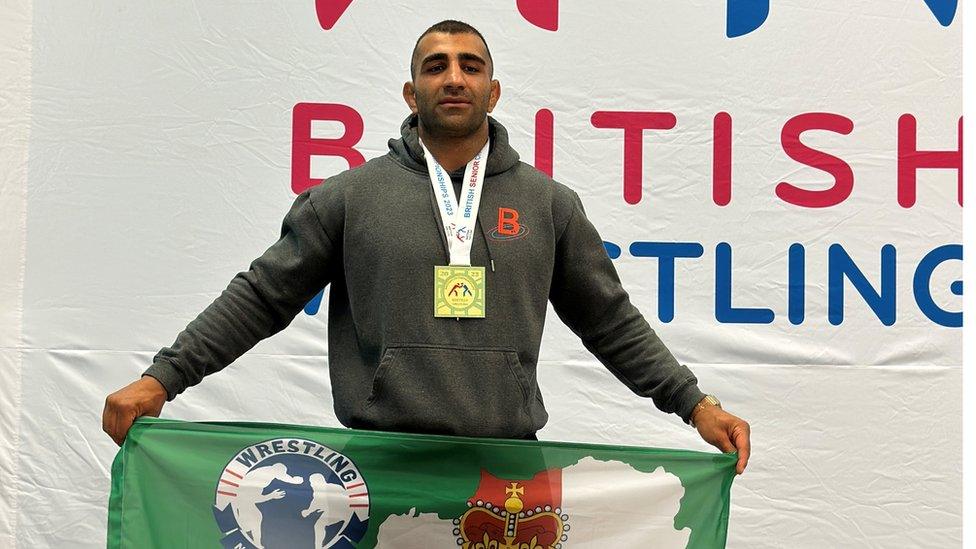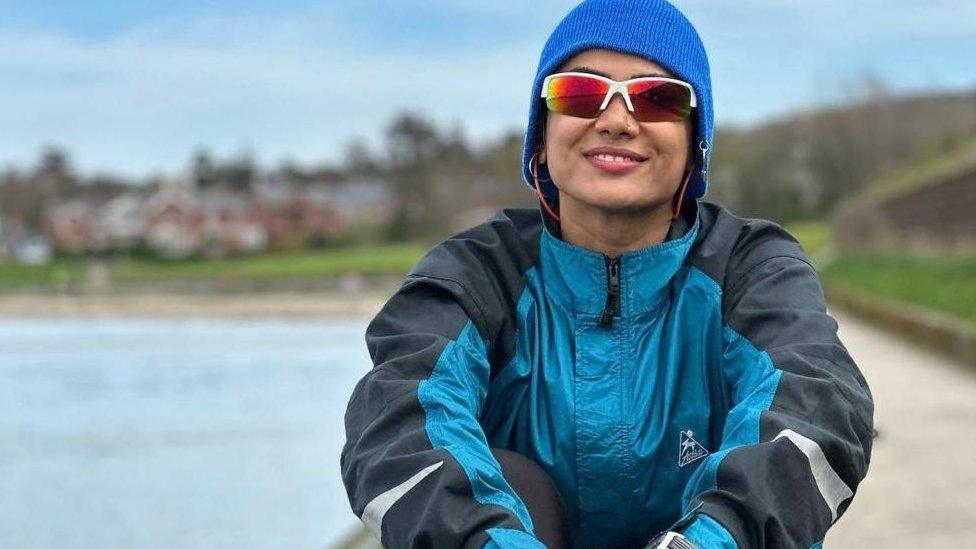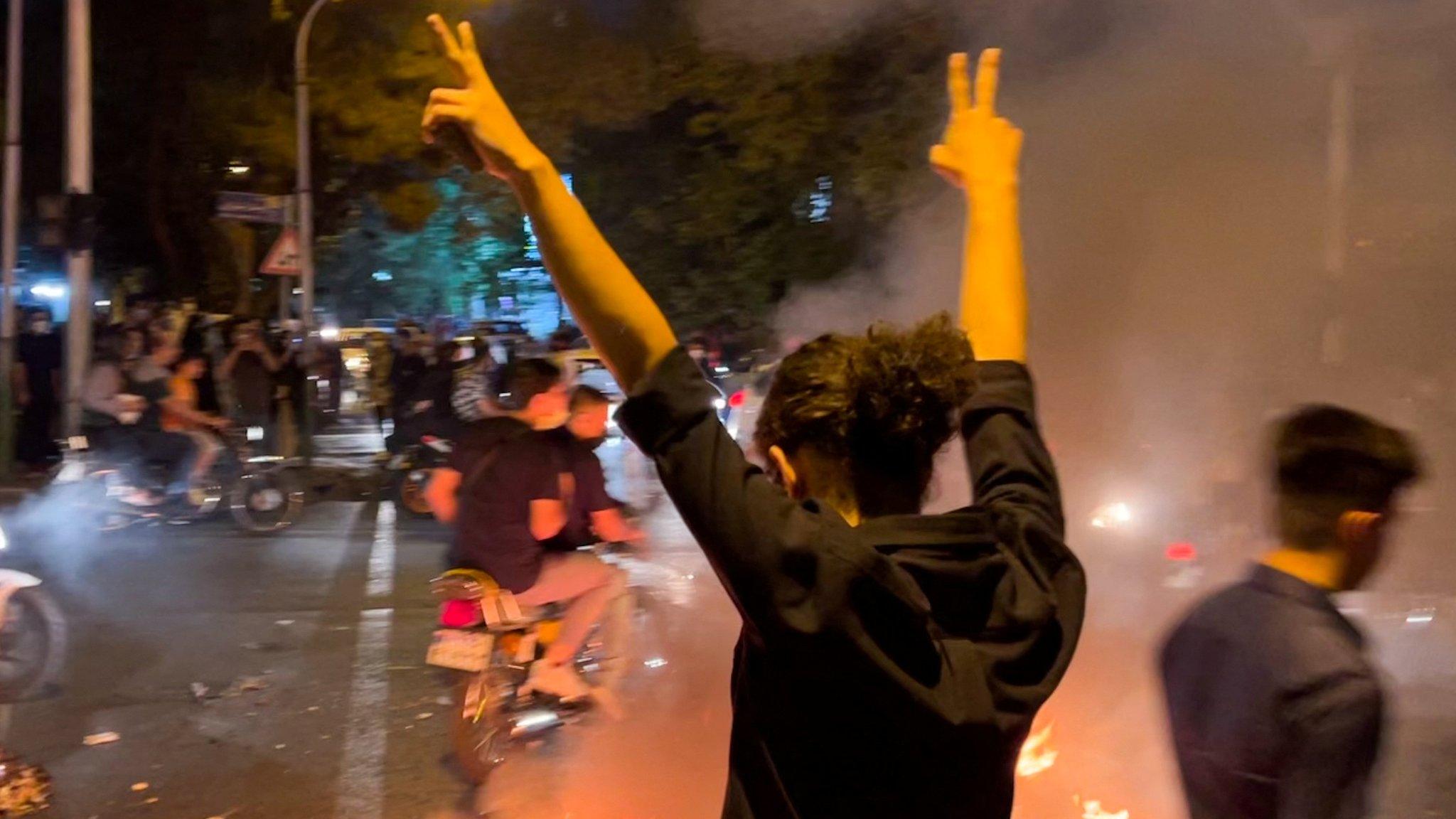Iranian refugees fled to NI for their 'futures and freedom'
- Published

Mehdi Zoodashna is a Greco Roman wrestler
Musicians and athletes from Iran who have settled in Northern Ireland are among more than 8,000 people from the country who have applied for asylum in the United Kingdom over the past year.
There are no exact figures for how many Iranians are living in NI.
But as protests continue across Iran on the issue of women's rights, BBC News NI spoke to some of those who have fled.
Among them is Mehdi Zoodashna.
He was a champion Greco Roman wrestler in Iran and has been in Northern Ireland for four months with his wife Diana Amini, who is a champion rower and coach.
Wrestling in the colours of the Barbarians club in Carrickfergus, County Antrim, Mehdi grappled his way to gold at the British Wrestling Championships last month - topping the podium in the Greco Roman category of the tournament in Manchester.
It was the first medal he's won since being in Northern Ireland, and he said his sights were now set on the Olympics.
"I really like Northern Ireland, the people are lovely and we get a lot of positive energy from them," he said.
"They are helping us to progress in our life and in our sport, and be more motivated.
"I've been a wrestler in my country and I work out a lot so I've just continued my job here and I achieved the medal here in Northern Ireland.
"The biggest dream for any professional like me is to participate in the Olympics.
"I've been fighting a lot, all my life, for this goal."
'We had to leave'
Of leaving Iran, the 30-year-old said: "Of course nobody wants to move out of their motherland but we've been struggling a lot with political, economic and social issues and we couldn't focus on our goal, every day we were focusing on the problems.
"Of course I'm eager to build up a new life here - I really want to develop in my sport and I want to help young people here develop in the sport."

Diana Amini says her Lagan Dragon teammates are like family
Since arriving in Northern Ireland, Diana Amini has been coaching the Lagan Dragons, a dragon boat club for people affected either directly or indirectly by breast cancer.
"I really like Northern Ireland and I'm feeling safe here. I've found lots of good friends, they've supported me and make me feel like I'm making progress.
"There are lots of issues in Iran at the minute and specifically because we work in sport, we had to leave."
Of her Lagan Dragon crew mates, Diana said: "I really love them, they treat me really good and we are like a family here.
"They are always telling me they support me, they love me. And I hope I can find my confidence back as a coach.
"Back in Iran I felt like they didn't appreciate me or what I've done but as I've come here, they tell me I have a very important job to do and they really appreciate me, it's a big deal really.
"They understand me. I have a lot of experience, I've been in this sport around 15 years and I'm educated in my sport. I like to pass on my experience to others and help."
The couple are keen to work in Northern Ireland as soon as possible but are currently unable to because of their asylum status.
"People need to work so they can get whatever they need and to focus on our goals - but the problem is now we are waiting on the Home Office decision," Diana said.
"Before that we cannot do work, we cannot enter some competitions so it's really hard for us.
"As a sportswoman I fight a lot to achieve my goals, and I've already been fighting for my life, so I don't want to be pessimistic - I want to be optimistic and I see the future really bright."
'Lucky to have her'
According to Home Office figures, there were 7,719 applications from Iranians for asylum in the UK in the year ending March 2023.
Karen Case captains the Lagan Dragons and said she was very proud of how the team had welcomed Diana.
"They've welcomed her not just into the club but into their lives," she said.
"She's competed at international level, won gold medals, and she's come to our little club. We're so lucky to have her."

Nasim Heidari and Omid Shir Mohammadi are both musicians
Musicians Nasim Heidari and Omid Shir Mohammadi, both 31, have been living in Belfast for more than a year.
They've been invited to perform at the WOMAD world music festival in Wiltshire in England, founded by music star Peter Gabriel, at the end of July.
"I really like it here, I feel peace here. I like the people, I like the accent," Nasim said.
"When I got here, I could see my future is brighter."
Of leaving Iran and performing at WOMAD, Nasim said: "One of the reasons was, there is no rights for women in Iran and it's so restricted for singing. I wanted to follow my dreams.
"Singing was illegal in Iran for women.
"This is like one of my dreams came true, to go there and perform there."
'It was for freedom'
Omid said he had "no freedom" to work as a musician in Iran.
"For a long time I didn't see my parents and my family. My brother died while I was out of my country - as you can imagine it was really not easy," he said.
"But if it is about safety, if it is about life, then there is no choice.
"Artists, writers, musicians, suffered a lot in Iran - especially women.
"Of course it was not easy, but it was for freedom.
"I feel a responsibility to help women artists from Iran. We should take care of each other as a human.
"Women have always been under pressure, and under limit, I feel really responsible as a man and as a music producer - I think we should support them."
Of his hopes for the future, Omid said: "If you asked me that question when I was in Iran, I would say my future looked very dark but now I see myself here and I have made a lot of friends, so I can say the future could be real bright for me."
Darren Ferguson from Beyond Skin, an organisation supporting Nasim and Omid, said: "When they're at WOMAD they're representing Iran but also Belfast on a global stage.
"We see this all the time where businesses and the creative industries recognise the talent and skills coming to our shores - unfortunately some of our political leaders do not recognise that.
"So I think this sends out a signal that the talent coming to our shores has been recognised at such a high level."
Related topics
- Published23 September 2022
